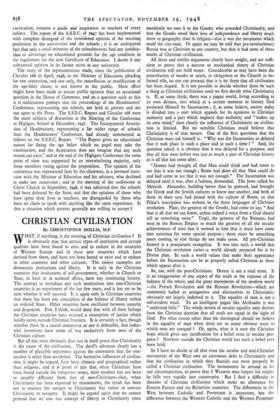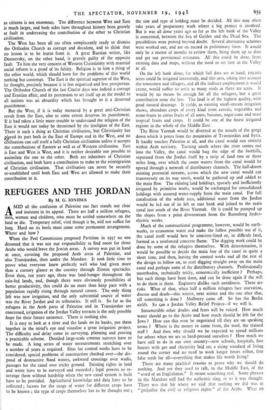CHRISTIAN CIVILISATION
By CHRISTOPHER HOLLIS, M.P.
WHAT, if anything, is the meaning of Christian civilisation ? It is obviously true that certain types of institution and certain qualities have been found to exist and to endure in the countries of Western Europe and in those new countries which have derived from them, and have not been found to exist and to endure in other countries and other cultures. The easiest examples are democratic institutions and liberty. It is only in the Christian countries that institutions of self-government, whether in Church or State, in local or in national affairs, have any continuing history. The attempt to introduce any such institutions into non-Christian countries is an experiment of the last few years, and it has yet to be seen whether it will succeed. It is again only in Christian countries that there has been any conception of the balance of liberty within an ordered State. Other countries have oscillated between anarchy and despotism. Few, I think, would deny that with all their failings the Christian countries have attained a conception of justice which hardly exists outside Christian frontiers. It is certainly a fact, though whether there be a causal connection or not is debatable, that indus- trial inventions have come all but exclusively from men of the Christian culture.
But all this most obviously does not in itself prove that Christianity is the cause of the civilisation. The devil's advocate clearly has a number of plausible arguments against the contention that the con- nection is other than accidental. The formative influences of civilisa- tion, it might be argued, have been climatic and geographical rather than religious, and it is proof of this that, when Christians have been found outside the temperate zones, their conduct has not been so notably different from that of non-Christians---that, when Christianity has been exported by missionaries, the result has been not to convert the savages to Christianity but rather to convert Christianity to savagery. It might be argued again that we cannot pretend that we owe our concept of liberty to Christianity since manifestly we owe it to the Greeks, who preceded Christianity, and that the Greeks owed their love of independence and liberty much more to geography than to religion--that it was the mountains which made the city-state. Or again we may be told that pre-revolutionary Russia was as Christian as any country, but that it had none of these marks of Christian civilisation.
All these and similar arguments clearly have weight, and are suffi- cient to prove that a narrow or mechanical theory of Christian civilisation will not hold water. Considerable as may have been the contribution of monks or saints, or clergymen or the Church in her formal role, no one can pretend that it is by them that all civilisation has been shaped. It is not possible to decide whether there be such a thing as Christian civilisation until we first decide what Christianity is. If, as some think, there was a pagan world, living according to its own devices, into which at a certain moment in history God projected Himself by Incarnation ; if, as some believe, society today is divided into a part which appeals for its opinions to Christian authority and a part which neglects that authority and " makes up its own mind," then clearly the influence of Christianity on civilisa- tion is limited. But no sensible Christian could believe that Christianity is of that nature. One of the first questions that the Christian must ask himself is : " Why was the Incarnation so delayed that it took place in such a place and at such a time ? " And, the question asked, it is obvious that it was delayed for a purpose, and that all that went before was just as much a part of Christian history as is all that has come after.
" Greece had thought all that Man could think and had come to see that it was not enough ; Rome had done all that Man could do and had come to see that it was not enough." The Incarnation was delayed until it was, after a fashion, demanded. The Jews called for Messiah. Alexander, building better than he guessed, had brought the Greek and the Jewish cultures to know one another, and both of them in their turn had joined with the culture of Rome, so that Pilate's inscription was written in the three languages of Christian revelation. Plato, the greatest of the Greeks, had come to say, "And that is all that we can knOw, unless indeed a voice from a God should tell us something more." Virgil, the greatest of the Romans, had seen in the Roman Empire so much 'the greatest of all the secular achievements of man that it seemed to him that it must have come into existence for some special purpose; there must be something more coming, or else things do not make sense. All pre-Christian history is a praeparatio evangelica. It was into such a world that the Christian revelation came—a world already prepared for it by Divine plan. In such a world values that make their appearance before the Incarnation can be as properly called Christian as those which appear after it.
So, too, with the post-Christians. Heresy is not a total error. It is an exaggeration of one aspect of the truth at the expense of the balance of the whole, and the great movements of the modem world —the French Revolution and the Russian Revolution—which are commonly hailed as antagonists and alternatives to Christianity obviously are largely indebted to it. The equality of man is not a self-evident truth. To an intelligent pagan like Alcibiades it was "confessed folly." The whole notion of secular equality only derives from the Christian doctrine that all souls are equal in the sight of God. For what reason other than the theological should we believe in the equality of man when there are so many obvious ways in which men are unequal ? Or, again, what is it save the Christian hope which gives any justification for a belief even in secular pro- gress ? Nowhere outside the Christian world has such a belief ever been held.
So I have no doubt at all that even the secular and anti-Christian movements of the West owe an enormous debt to Christianity and that the civilisation in which they flourish can most properly be called a Christian civilisation. The monuments lie around us for our circumspection, to prove that if Western man forgets his origins he falls very rapidly into catastrophe. But I find a difficulty in theories of Christian civilisation which make no allowance for Eastern Europe and the Byzantine countries. The differences in the West between Catholic and Protestant is important, but the difference between the' Western Catholic and the Western Protestant as citizens is not enormous. The difference between West and East is much larger, and both sides have throughout history been gravely at fault in underrating the contribution of the other to Christian civilisation.
The West has been all too often complacently ready to dismiss the Orthodox- Church as corrupt and decadent, and to think that no lesson is to be learnt from it. A great Russian writer, like Dostoevsky, on the other hand, is gravely guilty of the opposite fault. To him the very concern of Western Christianity with material social reform is a proof of its falsity. Religion is to him a thing of the other world, which should have for the problems of this world nothing but contempt. The East is the spiritual superior of the West, he thought, precisely because it is less organised and less prosperous. The Orthodox Church of the last Czarist days was indeed a corrupt and Erastian affair, and its pretension to set itself up as the model to all nations was an absurdity which has brought to it a deserved punishment.
But the West, if it is today menaced by a great anti-Christian revolt from the East, also to some extent deserves its punishment. If it had taken a little more trouble to understand the religion of the East it would not today be threatened by the irreligion of the East. There is such a thing as Christian civilisation, but Christianity has eyed its part both in the East of Europe and in the West, and no civilisation can call itself a fully Christian civilisation unless it accepts the contributions of Eastern as well as of Western civilisation. East is East and West is West, and it is neither desirable nor possible to assimilate the one to the other. Both are inheritors of Christian civilisation, and both'have a contribution to make to the reintegration of Christian civilisation. That civilisation can never be securely re-established until both East and West are allowed to make their contribution to it.



































 Previous page
Previous page